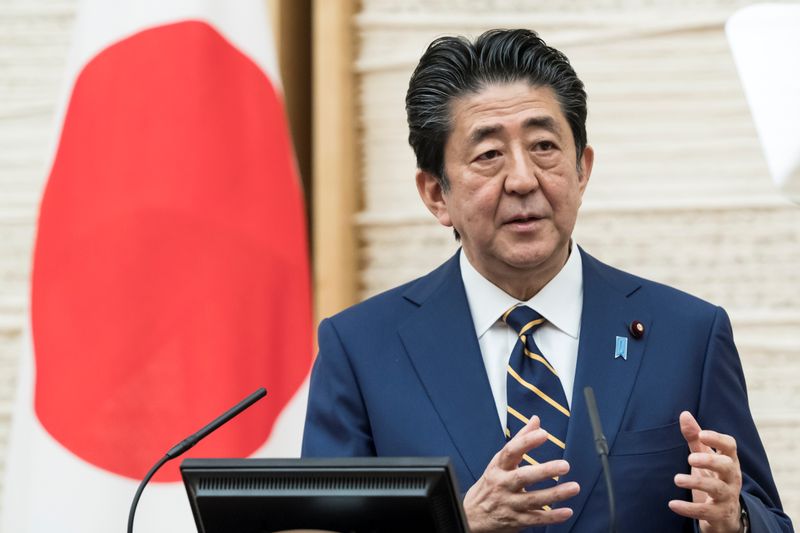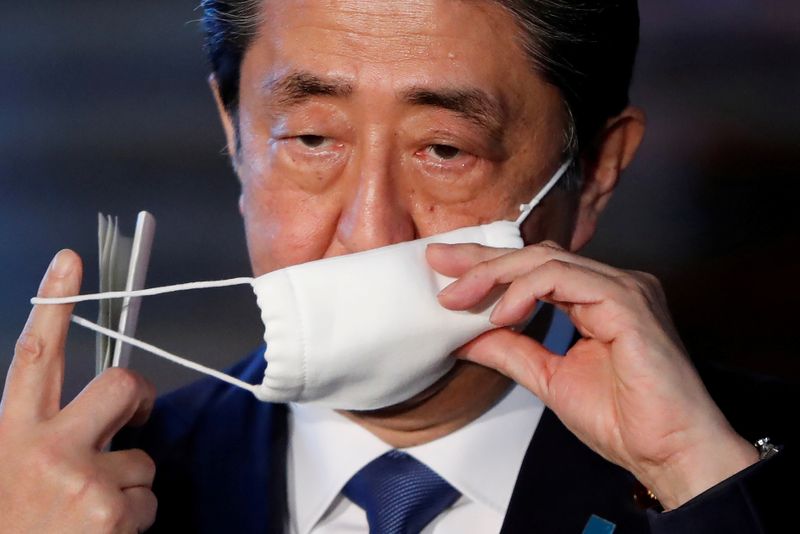By Kiyoshi Takenaka and Takaya Yamaguchi
TOKYO (Reuters) - Japanese Prime Minister Shinzo Abe on Tuesday declared a state of emergency to fight coronavirus infections in major population centres and rolled out a nearly $1 trillion stimulus package to soften the economic blow.
The state of emergency, giving authorities more power to press people to stay at home and businesses to close, will last a month and be imposed in the capital, Tokyo, and six other prefectures, accounting for about 44% of Japan's population.
"It is no exaggeration to say that Japan’s economy, and the world economy, is facing the biggest crisis since postwar right now. We will protect the employment and life at all costs," Abe told a news conference.
Major department stores such as Isetan Mitsukoshi announced store closures, while restaurants and bars around Tokyo - many of which were still operating earlier this week - prepared to close.
Abe said that by reducing contact between people by 70% to 80%, the government hoped infections would peak in two weeks.
The government approved the stimulus package, worth 108 trillion yen ($990 billion). That is equal to 20% of Japan's economic output, more than the 11% of U.S. output for President Donald Trump's stimulus package and the 5% of output for Germany's package.
Direct fiscal spending will be 39.5 trillion yen, more than double the amount Japan spent following the 2008 collapse of Lehman Brothers.
Japan has been spared big outbreaks of the coronavirus, but a recent, steady rise in infections in Tokyo, Osaka and other areas led to growing calls for Abe to announce a state of emergency.
Coronavirus infections in Tokyo doubled to about 1,200 in the past five days, with more than 80 new cases reported on Tuesday, accounting for more than a quarter of cases in the country. That has led some critics to say the government's declaration was too little, too late.
Abe cited experts' view that at this pace, the tally could jump to 10,000 in two weeks and to 80,000 in a month.
"Clearly, we are approaching the limit in terms of hospital beds," he said.
The latest declaration of emergency gives governors the authority to call on people to stay at home and businesses to close. But with no penalties for ignoring the requests in most cases, enforcement will rely more on peer pressure and respect for authority.
Abe emphasised that the latest declaration was not a strict lockdown, as most banks, supermarkets and trains will operate as usual and people can go outdoors.
"Public transport such as trains and buses will run as normal and we will not block roads - experts all agree that there is no need to do so," he said.
SUFFICIENT FOOD
Tokyo Governor Yuriko Koike also sought to reassure residents that there would be no restrictions on buying groceries and medicine. But she pleaded that they stay at home as much as they could.
"Without preventing the spread of the infectious disease, you can't have your life back," she said.
Minister of Agriculture, Forestry and Fisheries Taku Eto called on shoppers to stay calm.
"We are asking citizens to buy only what they need when they need it, as there is sufficient food supply and no suspension is planned at food factories," he told reporters earlier, adding there was no sign of disruption to Japan's grain imports.
The restrictions will add to pains the virus is inflicting on the world's third-largest economy, which probably already in recession as supply chain disruptions and travel bans chill factory output and consumption.
Metropolitan Tokyo alone accounts for about 20% of Japan's overall gross domestic product.
Japan will sell a record amount of additional bonds worth more than 18 trillion yen to fund the package, adding to its huge debt which is twice the size of its economy.
While the stimulus could ease the immediate damage from the pandemic, lawmakers are already calling for even greater spending to prevent bankruptcies and job losses.

Analysts expect the economy, which shrank in the final quarter of last year, to post two more quarters of contraction, adding pressure on the government and the central bank to do more.
